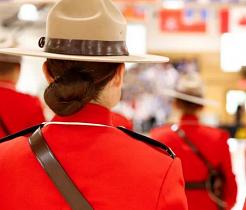Municipalities will pay up as Alberta adds 300 RCMP officers to combat rural crime
Hundreds of additional RCMP officers and civilian members will join Alberta's ranks as part of the province's ongoing offensive against rural crime, the province's justice minister says.
Small and rural communities, which currently don't contribute to policing costs, will help cover the extra expenses with a total of $200 million over the next five years under a modified provincial policing model.
Starting in April 2020, they will contribute 10 per cent of their policing costs, increasing to 30 per cent by 2023.
Justice Minister Doug Schweitzer is set to make the announcement Wednesday.
"This is the largest single investment in rural policing since the March West," when hundreds of North-West Mounted Police officers travelled across the Prairies in 1874, Schweitzer told CBC News on Monday.
"What we're talking about here is [$286] million of new money going into policing over a five-year period of time, and every single dollar is going to go back into frontline services in rural Alberta."
Roughly 300 uniformed officers will join detachments and specialized RCMP units across the province. An additional 200 civilian members will carry out administrative and support roles.
The extra boots on the ground will be phased in gradually. Alberta currently has about 1,600 RCMP officers. By the time the new model is fully implemented, it will have around 1,900.
Wednesday's announcement comes after Schweitzer listened to fears, frustrations and hardships felt by Albertans impacted by rural crime at dozens of town halls across the province.
"The overwhelming feedback we heard across the province is that it takes too long for the police to respond to emergency situations, it takes too long for them to respond to simple break and enters that just need follow up," Schweitzer said.
"So really, making sure that we have the proper number of law enforcement personnel in rural Alberta was something that we heard loud and clear."
- 'We're in a war against crime': Northern Alberta hamlet pleads for help
- Frustration and fear as St. Paul area residents share experiences with rural crime
- 'They were going to kill her': Mother of 4 beaten, carjacked outside rural home
The announcement is the latest in a flurry of measures to tackle rural crime which also includes the expansion of the drug treatment court program and the addition of hundreds more treatment beds.
The government has also increased penalties for trespassing under legislation that also protects property owners from civil liability if trespassers committing criminal offences get injured.
Sheriffs and fish and wildlife officers have also gained new powers as part of a Rural Alberta Provincial Integrated Defence Force (RAPID) aimed at shortening 911 response times.
"We have a huge amount of land to cover," Schweitzer said. "We're always going to need to be able to respond in a timely way. And it's the right decision to provide them with additional training so that we can get them to respond to crisis situations as well as alleviate pressures on the police."
Under the current funding model, Alberta pays $262.4 million for policing and the federal government contributes $112.4 million.
Towns, counties, improvement districts and municipal districts with fewer than 5,000 people currently don't contribute to policing costs.
- New funding proposal for policing angers rural municipalities
- 'Sentenced to recovery': Alberta expands drug treatment court program
- Alberta sheriffs, fish and wildlife officers to gain new powers under proposed rural crime plan
But legislation passed in late November allows the province to start charging them for police services.
Municipalities will be responsible for $15.4 million of policing costs in 2020, and $60.3 million in 2023. The total contributions from small and rural municipalities will be $200.6 million by 2024.
The extra money from rural municipalities will trigger an increase in federal spending on the RCMP in Alberta, which splits costs 70-30 with Ottawa under the provincial police service agreement. The additional federal spending will total $86 million for the five-year period ending April 1, 2024.
In October, some municipal leaders complained that they had not been properly consulted about changes to the funding model that they said would require cuts to services and increases in taxes.






